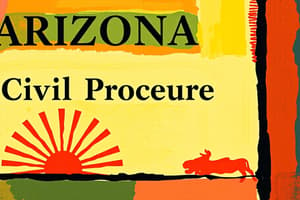Podcast
Questions and Answers
What does the Overriding Objective (OO) aim to ensure?
What does the Overriding Objective (OO) aim to ensure?
- Ensuring the court remains impartial
- Achieving a fair resolution of disputes. (correct)
- Promoting lengthy proceedings
- Favoring one party over another
The court must give effect to the Overriding Objective when it interprets any rule.
The court must give effect to the Overriding Objective when it interprets any rule.
True (A)
What is one of the duties of the parties in relation to the Overriding Objective?
What is one of the duties of the parties in relation to the Overriding Objective?
To help the court further the Overriding Objective.
Which of the following is NOT a part of active case management?
Which of the following is NOT a part of active case management?
The court’s duty includes actively managing cases to further the ______.
The court’s duty includes actively managing cases to further the ______.
What are cost sanctions used for in the context of ADR?
What are cost sanctions used for in the context of ADR?
Flashcards are hidden until you start studying
Study Notes
Overriding Objective (OO)
- The overriding objective aims to ensure just handling of cases at a reasonable cost.
- Key components of OO:
- Equality of arms: Ensuring equal opportunity for parties to present their case.
- Saving costs during proceedings.
- Proportionality: Tailoring case handling to the following factors:
- Monetary value involved.
- Importance of the case.
- Complexity of issues.
- Financial position of each party.
- Expeditious and fair case management.
- Allocating appropriate court resources while considering other pending cases.
- Enforcing compliance with rules, practice directions, and court orders.
Court's Duty Regarding Overriding Objective
- Courts must strive to give effect to the overriding objective when exercising any powers or interpreting rules.
- Importance of compliance with established rules and precedents.
Parties' Duty Regarding Overriding Objective
- Parties are expected to assist the court in furthering the overriding objective.
- Cooperation examples include agreeing to reasonable time extensions without hindering proceedings.
- Courts can monitor compliance with directions and parties are required to respond promptly.
Active Case Management
- Courts are mandated to actively manage cases to further the overriding objective.
- Elements of active case management:
- Encouraging party cooperation throughout proceedings.
- Identifying relevant issues early in the process.
- Making prompt decisions on cases requiring full investigation versus those suitable for summary disposal.
- Establishing the order in which issues should be addressed.
- Promoting and facilitating alternative dispute resolution (ADR) when appropriate, with potential cost sanctions for non-compliance.
- Assisting parties in settling all or parts of cases, including cost sanctions for specific offers (e.g. Part 36 offers).
- Setting timetables and managing compliance timelines to ensure efficient case progression.
Studying That Suits You
Use AI to generate personalized quizzes and flashcards to suit your learning preferences.




